EXPLAINER: How China made 'false notions' to make it appear PH compromised its SCS stance
China has been accused by the Philippines of "mischaracterizing" facts to make it appear like the latter compromised its position in the South China Sea issue.
The Department of Foreign Affairs (DFA) hit Beijing for doing so, calling its previous statement as "inaccurate," "false," and "mischaracterized."
What did China do? For the Philippine government, it made "false notions" and "misrepresented" its statements so the Philippines would look like it made some compromise before a new arrangement for resupply mission to the grounded BRP Sierra Madre became possible.
Here's what happened:
On July 22, the Chinese Foreign Ministry confirmed that a new understanding was reached between Manila and Beijing to manage the current situation in the West Philippine Sea, particularly in the Ayungin Shoal where Philippine troops had faced physical aggression from China while conducting resupply missions.
But its statement on that day claimed the Philippines recognized China's various positions in the sea row, and eventually agreed to the new arrangement.
Its statement started with laying out its often repeated claims, which had already been refuted by the Philippine government several times in the past.
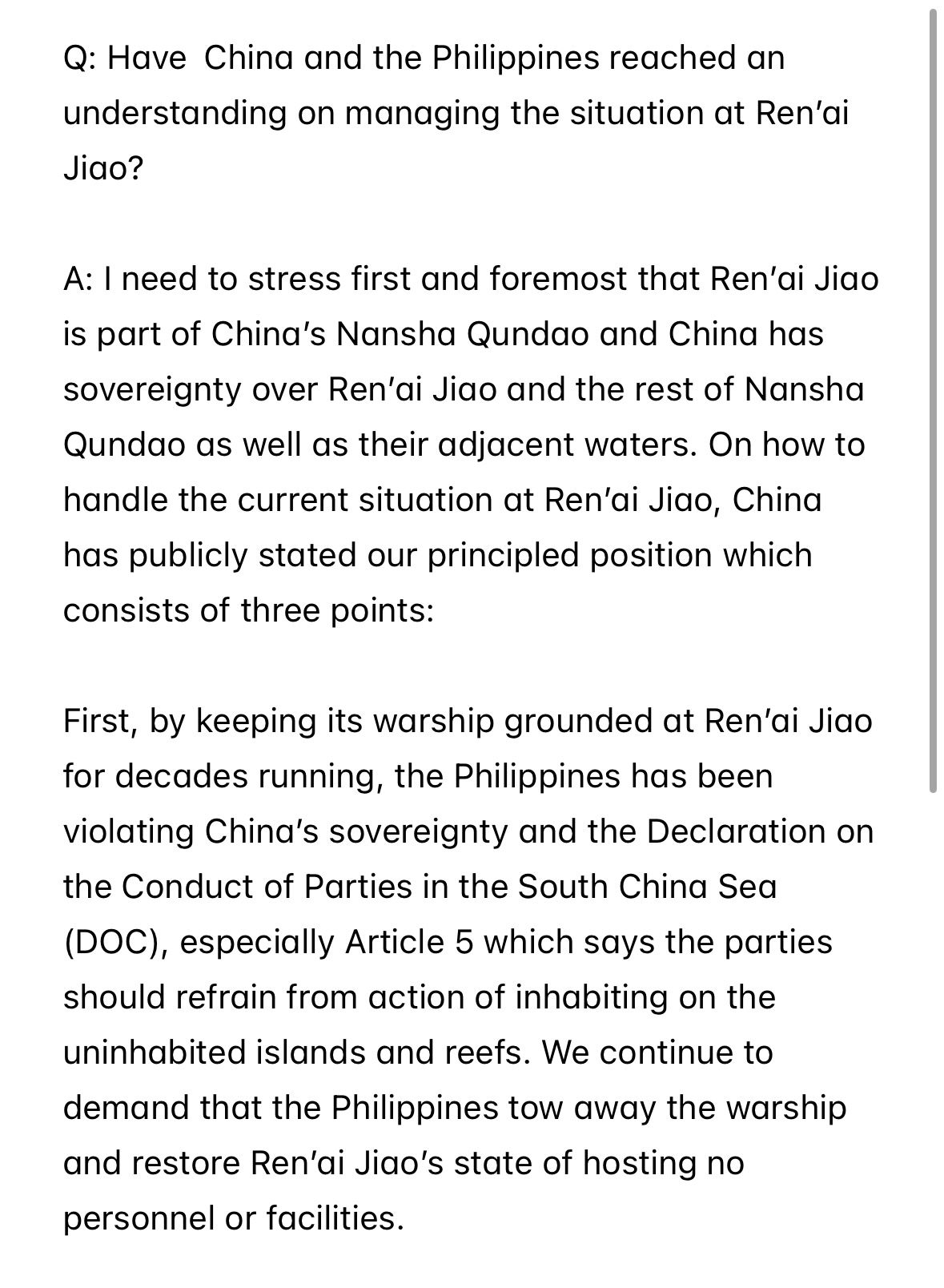
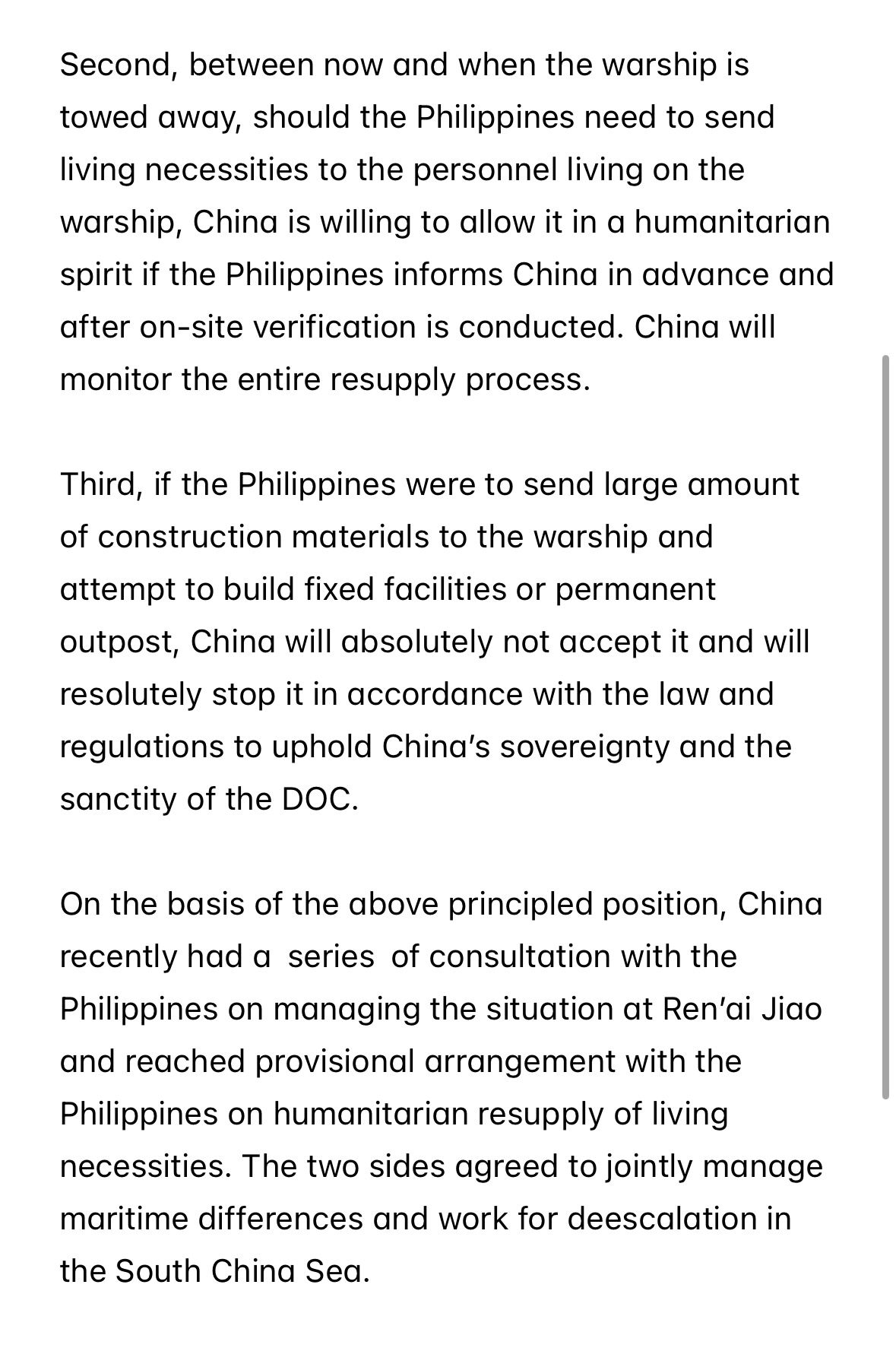
China's Foreign Ministry's July 22 statement
The three points that China supposedly raised with the Philippines before an arrangement was agreed by both sides were:
- The Philippines is supposedly violating the Declaration of Conduct (DOC) on the South China Sea by grounding the BRP Sierra Madre in the Ayungin Shoal.
- The Philippine government has been told that it can only send supplies to the grounded ship upon prior notification and onsite inspection.
- China will not allow the sending of large construction materials to the grounded ship.
China said that "on [such] basis," Beijing recently had a series of consultations with Manila, "and reached provisional arrangement with the Philippines on humanitarian resupply of living necessities."
But the DFA expressed objections to what it called "prejudicial" statement by its Chinese counterpart.
"The principles and approaches laid out in the agreement were [rather] reached through a series of careful and meticulous consultations between both sides that paved the way for a convergence of ideas without compromising national positions," DFA spokesperson Ma. Teresita Daza said.
So, she added: "The [Chinese foreign ministry's] spokesperson’s statement therefore regarding prior notification and onsite confirmation is inaccurate."
"I want to stress that the agreement was concluded with the clear understanding by both sides that it will not prejudice our respective national positions," she also said.
Then came the July 27 resupply mission—the first RORE that happened after the new arrangement was made.
It was the DFA that first publicly announced that a mission by the Philippines succeeded, with civilian ship MV Lapu-Lapu being commissioned to bring supplies. Lapu-Lapu was escorted by Philippine Coast Guard's BRP Cape Engaño, according to DFA.
In its statement, the Philippines did not mention anything that would prejudice each other's position over the South China Sea issue. Instead, it focused on the details that made the mission possible.
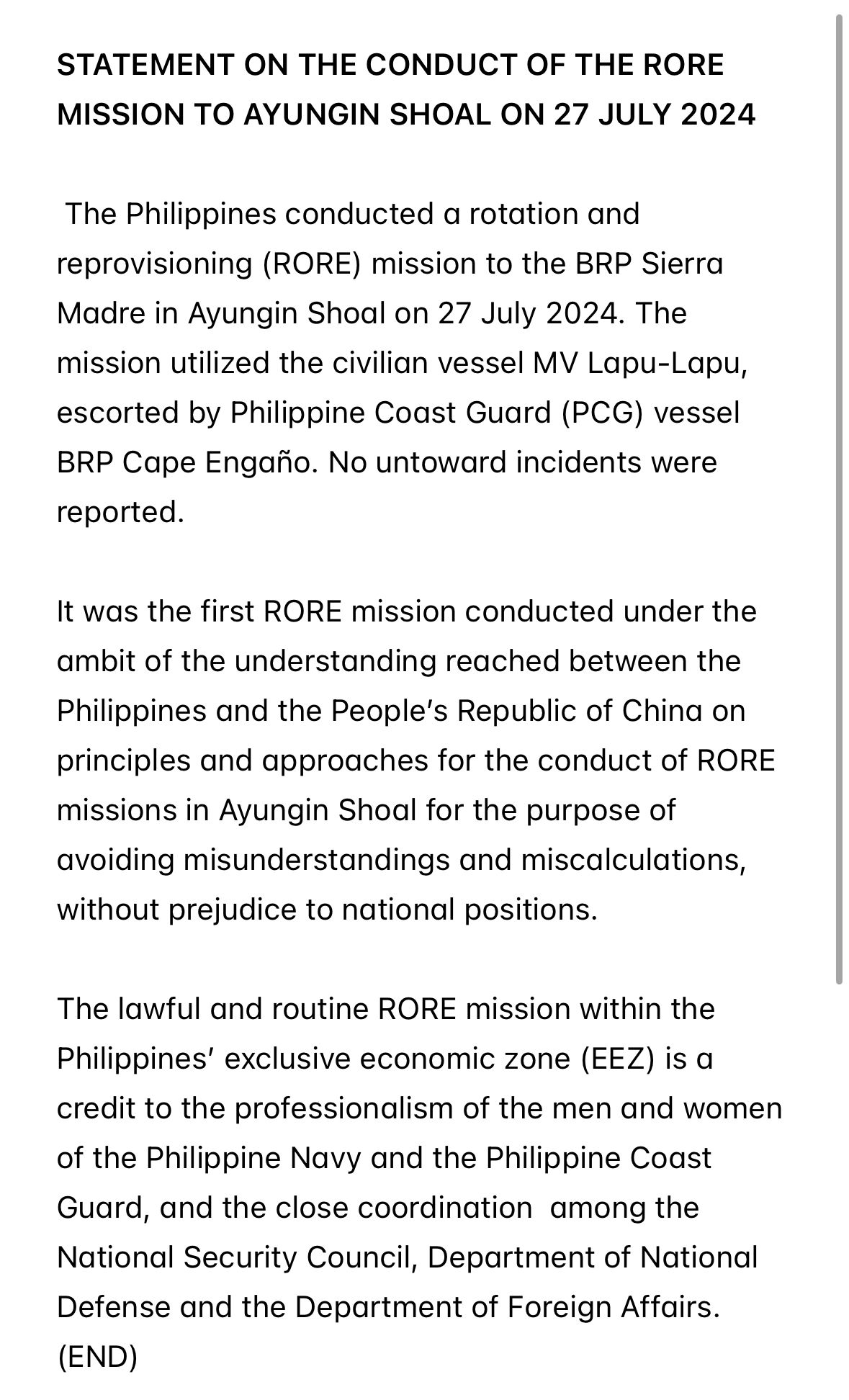
That included: "No untoward incidents were reported," "It was the first RORE mission conducted under the ambit of the understanding reached between the Philippines and the People’s Republic of China," and "The lawful and routine RORE mission within the Philippines’ exclusive economic zone (EEZ) is a credit to the professionalism of the men and women [of various Philippine government agencies]."
But China’s statement is slightly different. Although it also announced that a successful RORE mission by the Philippines happened, the Chinese Foreign Ministry said it became possible because "the entire process was monitored by China Coast Guard."
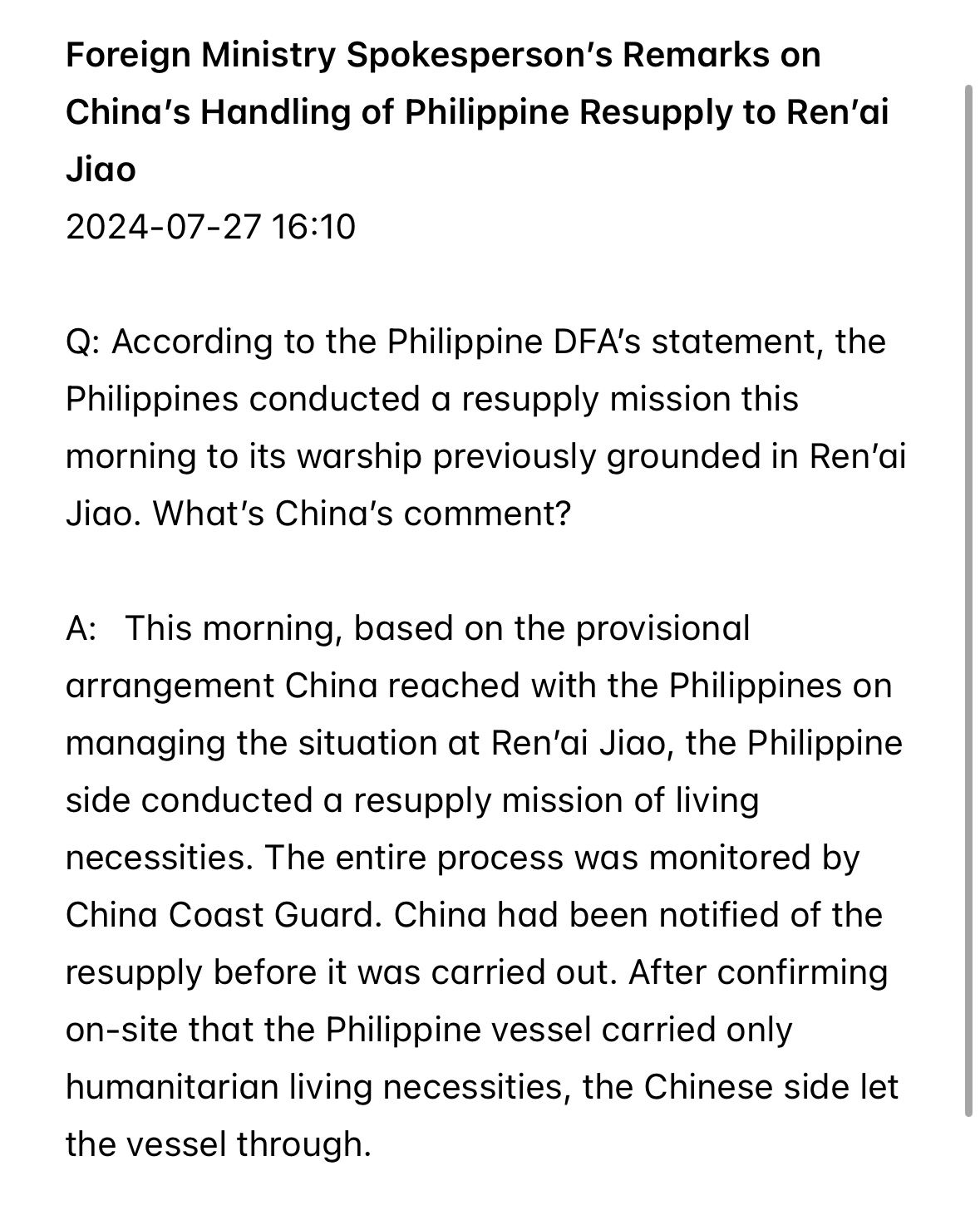
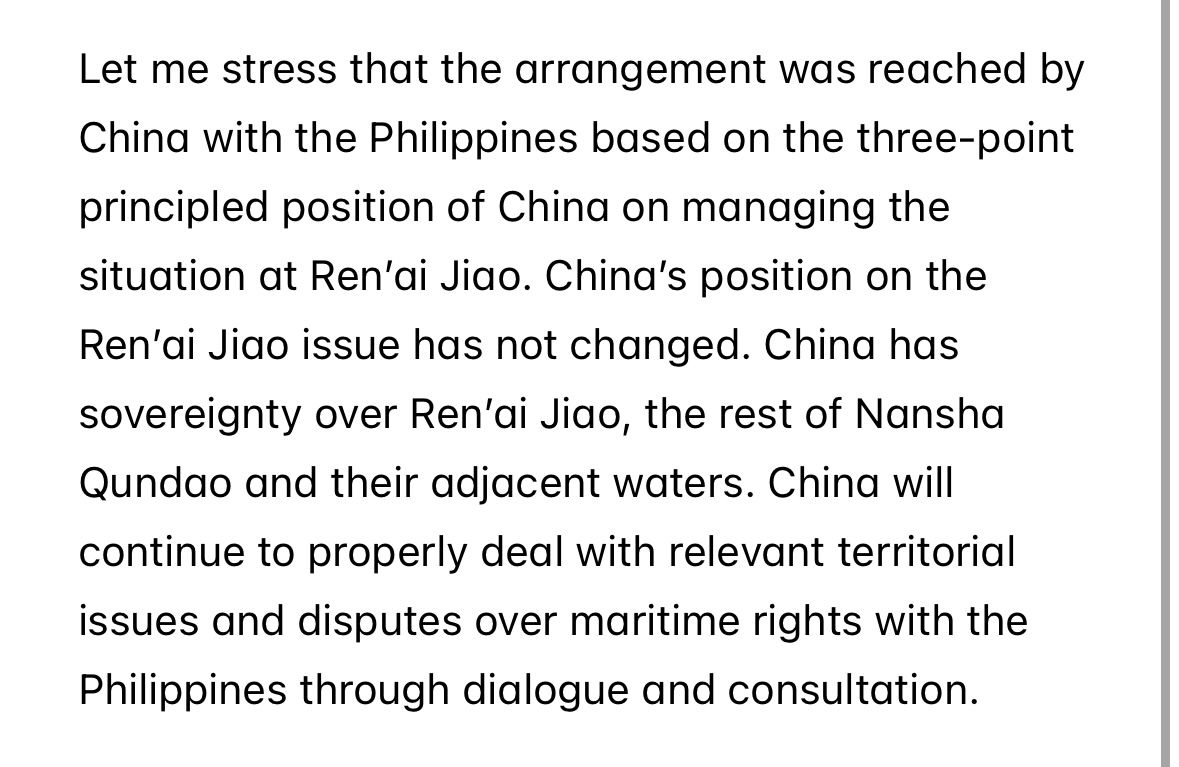
It also said that "China had been notified of the resupply before it was carried out. Therefore, "after confirming onsite that the Philippine vessel carried only humanitarian living necessities, the Chinese side let the vessel through," it added.
Daza, as soon as the claim was made, rejected China's narrative. She stressed the country's position: "no to prior notification, no to onsite inspection."
On Sunday, July 28, the DFA issued a strong statement to counter China's narrative about the latest incident.
Daza said "it is unfortunate that the MFA Spokesperson has mischaracterized the Philippines' RORE mission yesterday morning."
And "instead of acknowledging how two countries were able to manage differences in order to avoid miscalculation and misunderstanding, the spokesperson chose to misrepresent what has been agreed between the Philippines and China regarding RORE missions in Ayungin Shoal."
"Let us make it absolutely clear: the understanding between the Philippines and China was concluded in good faith, with the explicit agreement that it will not prejudice national positions," Daza said.
She also gave advice that it is not going to be helpful if China would continue "giving false notions" about what was agreed on and how they were implemented.
"The Philippines’ core positions on West Philippine Sea issues remain clear and consistent, including as regards our legally-settled maritime entitlements and our lawful right to conduct routine activities within our own exclusive economic zone," she said.
"The BRP Sierra Madre is a commissioned naval vessel and its presence in Ayungin Shoal is well within the Philippines’ sovereign rights and jurisdiction," she added.